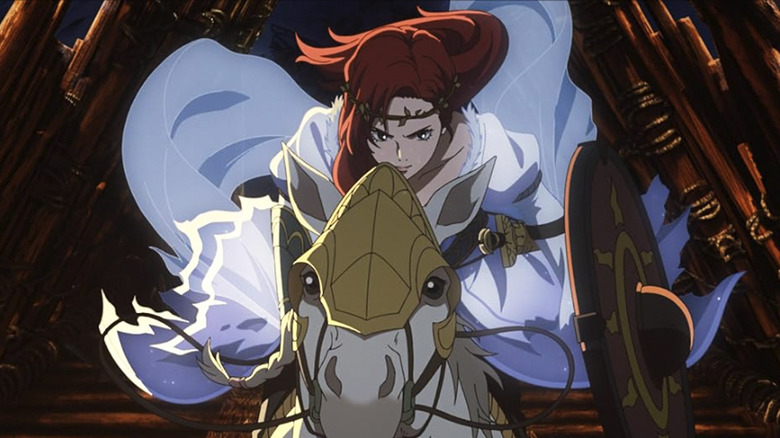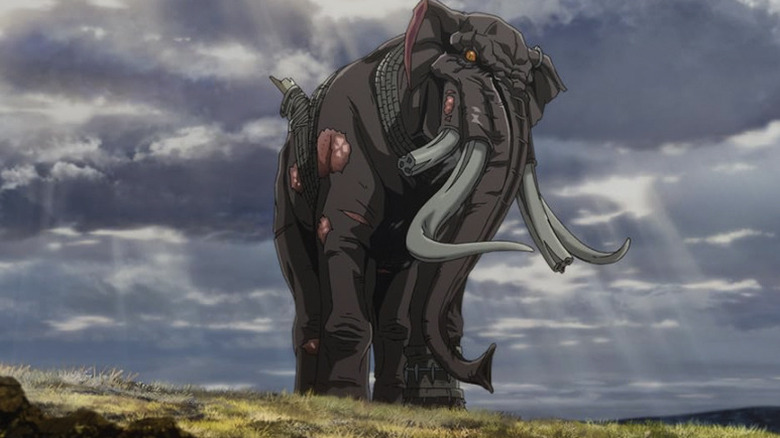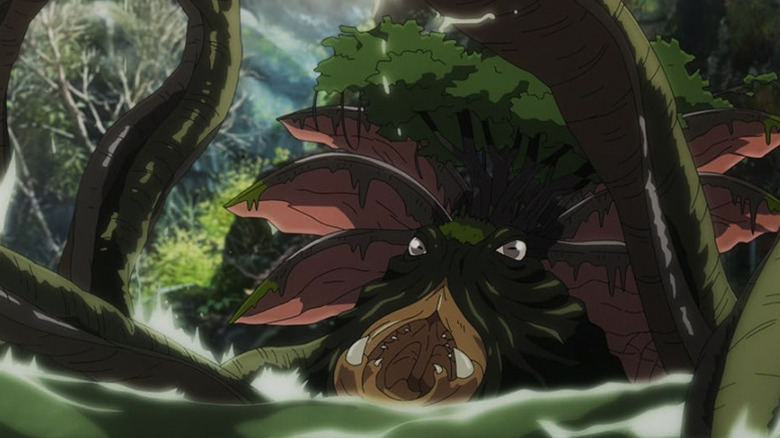One War Of The Rohirrim Moment Is More Disturbing Than Anything In The Lord Of The Rings Film Trilogy
This post contains light spoilers for "The Lord of the Rings: The War of the Rohirrim."
Amid all of the jaw-dropping fantasy storytelling in Peter Jackson's original "The Lord of the Rings" trilogy, there are flashes of occasionally disturbing moments. Uruk-hai being birthed from mud, Gollum biting into the flesh of a raw fish, Frodo getting stabbed and wrapped up by a giant spider, Denethor messily chomping on small tomatoes leading the juice to dribble down his chin ... there are plenty of shots where it feels like Jackson and his collaborators are almost delighting in making audiences squirm in their seats a little. With some of the same people working on "The Lord of the Rings: The War of the Rohirrim," Warner Bros.' latest big-screen return to Middle-earth, perhaps it shouldn't be surprising that there's a particularly gnarly moment in the new movie as well. But the surprising thing is that the scene in question from this anime film actually ended up being more disturbing than anything in the entire live-action trilogy.
The rabid mûmak was The War of the Rohirrim's nod to an anime trope
Relatively early in "The War of the Rohirrim," Héra (Gaia Wise), the daughter of King Helm Hammerhand, is out riding in Rohan with a small group of friends and family. Suddenly, they encounter a diseased mûmak (also known as an oliphaunt), a massive elephant creature typically used by armies in battle. This one is rabid and wildly roaming the plains of Rohan, and very nearly kills a member of Héra's party. Thinking quickly, Héra manages to lure it away from her friends and into some nearby woods, drawing the rampaging beast toward a swampy section of the forest — where it's shockingly grabbed by a squid-like creature who has been living in that area long enough for trees to grow atop its head. The mûmak fights briefly with the creature, but ultimately loses; the squid-creature eventually lifts the mûmak into its mouth and devours it whole.
I recently spoke with co-writer and producer Philippa Boyens, who told me how this confrontation came to be:
"That was a nod to anime. So as much as we were trying to remain faithful to Professor Tolkien's work, this is also an anime film. And [producer] Jason DeMarco, he was kind of the perfect partner in making this film because he's such a huge anime nerd and he's also a Tolkien nerd. And he said to me, he said, 'Phil, we need a monster versus monster. We've just got to, it is a trope in anime.' And so then it became a question of, well, how can we do both? Can we give the anime audience this, but also make it work within this world? And that's where the rabid mûmak came in."
The War of the Rohirrim really lingers on this moment
A similar creature appears in "The Fellowship of the Ring" outside the Doors of Durin. There, Frodo is ensnared by the tentacles of a being known in Tolkien lore as the Watcher in the Water, a horrific squid-beast who nearly eats him alive before the hobbit is saved by Aragorn, Legolas, and other members of his party; the group narrowly escapes the beast's wrath and temporarily lock themselves inside Khazad-dûm as a result. In that film, the scene is played as a fast-paced, high-energy rescue mission: a breathless close call that propels the characters deeper on their journey.
"The War of the Rohirrim," in contrast, takes its time with this moment, lingering on the mûmak's struggles against its inevitable death and forcing us to uncomfortably watch this creature be ingested. Maybe it's the fact that the "Fellowship" scene was live-action characters interacting with a clearly fake CG object and the "Rohirrim" scene is two fully animated characters on a metaphorically even playing field, but watching the diseased oliphaunt wriggle and writhe while it's slowly and deliberately being forced down the gullet of this gigantic beast was more disturbing to me than any of the human-on-human violence in the rest of the movie. For a few minutes, "The War of the Rohirrim" effectively becomes a nature documentary and confirms that even in Middle-earth, the circle of life is omnipresent but sometimes hard to swallow.
"The Lord of the Rings: The War of the Rohirrim" is in theaters now.


